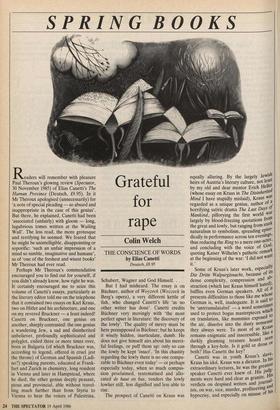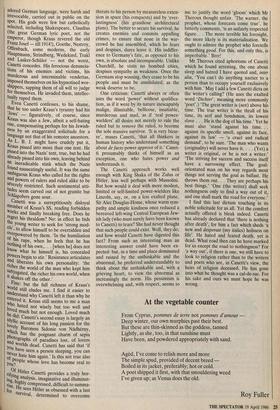SPRING BOOKS
Readers will remember with pleasure Paul Theroux's glowing review (Spectator, 30 November 1985) of Elias Canetti's The Human Province (Deutsch, £9.95). In it Mr Theroux apologised (unnecessarily) for 'a note of special pleading — so absurd and inappropriate in the case of this genius'. But there, he explained, Canetti had been 'associated (unfairly) with gloom — long, lugubrious tomes written at the Wailing Wall'. The less read, the more grotesque and terrifying he seemed. We feared that he might be unintelligible, disappointing or soporific: 'such an unfair impression of a mind so nimble, imaginative and humane', as of 'one of the freshest and wisest books' Mr Theroux had ever read.
Perhaps Mr Theroux's commendation encouraged you to find out for yourself, if you didn't already know, how right he was. It certainly encouraged me to seize this volume of Canetti's essays, particularly as the literary editor told me on the telephone that it contained two essays on Karl Kraus, two on Hitler and his architecture, and one on my revered Bruckner — a feast indeed! Canetti on Bruckner, one genius on another, sharply contrasted: the one genius a wandering Jew, a sad and disinherited unbeliever, profoundly sophisticated and polyglot, exiled three or more times over, born in Bulgaria (of which Bruckner was, according to legend, offered in cruel jest the throne) of German and Spanish (Ladi- no?) speaking parents, educated at Frank- furt and Zurich in chemistry, long resident in Vienna and later in Hampstead, where he died; the other genius deeply peasant, pious and provincial, able without travel- ling much further than from Styria to Vienna to hear the voices of Palestrina,
Grateful for rape
Colin Welch
THE CONSCIENCE OF WORDS by Elias Canetti
Deutsch, f8.95
Schubert, Wagner and God Himself.. .
But I had misheard. The essay is on Bilchner, author of Woyzeck (Wozzeck in Berg's opera), a very different kettle of fish, who changed Canetti's life 'as no other writer has done'. Canetti credits Biichner very movingly with 'the most perfect upset in literature: the discovery of the lowly'. The quality of mercy must be here presupposed in Biichner; but he keeps it wisely hidden, inarticulate, dumb. He does not give himself airs about his merci- ful feelings, or puff them up: only so can the lowly be kept 'intact'. 'In this chastity regarding the lowly there is no one compa- rable to Buchner even today' — or perhaps especially today, when so much compas- sion proclaimed, systematised and allo- cated de haut en bas, renders the lowly lowlier still, less dignified and less able to rise.
The prospect of Canetti on Kraus was equally alluring. By the largely Jewish heirs of Austria's literary culture, not least by my old and dear mentor Erich Heller (whose essay on Kraus in The Disinherited Mind I have stupidly mislaid), Kraus was regarded as a unique genius, author of a horrifying satiric drama The Last Days of Mankind, pillorying the first world war largely by blood-freezing quotations from the great and lowly, but ranging from stark naturalism to symbolism, spreading episo- dically in performance across ten evenings, thus reducing the Ring to a mere one-acter, and concluding with the voice of God' quoting Kaiser Wilhelm's pathetic remark at the beginning of the war: 'I did not want it.' Some of Kraus's later work, especially Die Dritte Walpurgisnacht, because of its dense complexity, compression and ab- straction (which last Kraus himself hated), baffles even German speakers. All of it presents difficulties to those like me whose German is, well, inadequate. It is said to be 'untrransslatabel' — a word sometimes used to protect bogus masterpieces which on translation, like mummies exposed to the air, dissolve into the dusty nonsense they always were. To most of us Kraus remains enigmatic and inaccessible, like a darkly gleaming treasure hoard seen through a key-hole. Is it gold or dross of both? Has Canetti the key? Canetti was in youth Kraus's slave, Kraus his idol. Kraus was a dictator. In his extraordinary lectures, he was the greatest speaker Canetti ever knew of. His judg- ments were hard and clear as granite. His verdicts on despised writers and journal; ists, on war, vice, murder, profiteering and hypocrisy, and especially on misuse of his adored German language, were harsh and irrevocable, carried out in public on the spot. His gods were few but catholically selected, including Shakespeare, Claudius (the great German lyric poet, not the emperor, though Kraus revered the old Franz Josef — till 1914!), Goethe, Nestroy, Offenbach, some moderns, the early Hauptman, Strindberg, Wedekind, Trakl and Lasker-Schuler — not the worst, Canetti concedes. His ferocious denuncia- tions of his enemies and victims, his murderous and interminable vendettas, imposed themselves on his hypnotised wor- shippers, sapping them of all will to judge for themselves. He invaded them, intellec- tually raped them. Even Canetti confesses, to his shame, that he too under Kraus's tyranny had his `Jews' — figuratively, of course, since Kraus was also a Jew, albeit a self-hating one, compensating perhaps for his Jewish- ness by an exaggerated solicitude for a language not that of his remoter ancestors. As L. B. J. might have crudely put it, Kraus pissed into more than one tent. He pissed into the Nazis' tent, true, but he had already pissed into his own, leaving behind an ineradicable stink which the Nazis found nauseatingly useful. It was the same ambiguous Kraus who called for the rights and powers of rulers and ruled alike to be severely restricted. Such sentimental atti- tudes seem carved out of not granite but Schlagobers gone sour. Canetti was a surreptitiously disloyal member of Kraus's SS, reading forbidden works and finally breaking free. Does he regret his thraldom? No: in effect he bids the Young writer to seek for 'strong mod- els', to allow himself to be overridden and overpowered by them. 'In the humiliation of his rape, when he feels that he has nothing of his own,. . . [when he] does not Imow what he himself is, his concealed Powers begin to stir.' Resistance articulates and liberates his own personality: 'the richer the world of the man who kept him Subjugated, the richer his own world, when it shakes off the other.' Fine: but the full richness of Kraus's world still eludes me. I find it easier to understand why Canetti left it than why he entered it. Kraus still seems to me a man who hated not wisely but too well and loved much but not enough. Loved much he Canetti's second essay is largely an idylhc account of his long passion for the lovely Baroness Sidonie von Nadheniy, Winch has the poignant charm of sepia Photographs of paradises lost, of lovers and worlds dead. Canetti has said that 'if You have seen a person sleeping, you can never hate him again.' Is this not true also 'Jr people whose love has become real to You?
Of Hitler Canetti provides a truly hor- !IVIng analysis, imaginative and illuminat- ing, highly compressed, difficult to summa- rise. He sees Hitler as obsessed with a lust for survival, determined to overcome threats to his person by measureless exten- sion in space (his conquests) and by 'ever- lastingness' (his grandiose architectural plans). The better to secure his survival, he creates enemies and commits appalling crimes, to ensure that none in the war- crowd he has assembled, which he fears and despises, dares leave it. His indiffer- ence to Germany's fate, as opposed to his own, is absolute and incomparable. Unlike Churchill, he visits no bombed cities, despises sympathy as weakness. Once the Germans stop winning, they cease to be his people and must be annihilated, as the weak deserve to be.
One criticism: Canetti always or often uses the word 'power' without qualifica- tion, as if it were by its nature inescapably malign, illimitable, bellicose, insatiable, murderous and mad, as if 'real power- wielders' all desire not merely to rule the ruled but to remove the ruled, to become the sole massive survivor. 'It is very bizar- re', muses Canetti, 'that all thinkers in human history who understand something about de facto power approve of it.' Canet- ti presumably thinks of himself as an exception, one who hates power and understands it.
The Canetti approach works well enough with King Shaka of the Zulus or Hitler, less well perhaps with Mussolini. But how would it deal with more modest, limited or self-limited power-wielders like Lincoln, say, or, on a less exalted plane, Sir Alec Douglas-Home, whose warm sym- pathy and simple kindness once reduced a bereaved left-wing Central European Jew- ish lady (who must surely have been known to Canetti) to tears? She had never thought that such people could exist. Well, they do; and how would Canetti have digested this fact? From such an interesting man an interesting answer could have been ex- pected: but, in a time and place dominated and ruined by the unthinkable and the abnormal, he preferred understandably to think about the unthinkable and, with a grieving heart, to view. the abnormal as increasingly the norm. His pessimism is overwhelming and, with respect, seems to me to justify the word 'gloom' which Mr Theroux thought unfair. 'The warner, the prophet, whose forecasts come true', he bitterly comments, 'is an unfairly respected figure. . . The more terrible his foresight, the more likely is its materialisation. We ought to admire the prophet who foretells something good. For this, and only this, is improbable.' Brrr!
Mr Theroux cited aphorisms of Canetti which he found arresting, the one about sleep and hatred I have quoted and, inter alia, 'You can't do anything nastier to a person than to occupy yourself exclusively with him.' May I add a few Canetti dicta on the writer's calling? (He uses the exalted word Dichter' , meaning more commonly `poet'.) 'The great writer is (not) above his time. The true writer is the thrall of his time, its serf and bondsman, its lowest slave . . . He is the dog of his time.' Yet he must also 'stand against his time. . . against its specific smell, against its face, against its law' — 'a cruel and radical demand', to be sure. 'The man who wants (originality) will never have it. . . . (Yet) a writer is original, or he is not a writer.' `The striving for success and success itself have a narrowing effect. The goal- orientated man on his way regards most things not serving the goal as ballast. He throws them out. . . They are perhaps his best things.' One (the writer) shall seek nothingness only to find a way out of it, and one shall mark the road for everyone.'
I find this last dictum touching in its noble solicitude for us all. Yet the comfort actually offered is bleak indeed. Canetti has already declared that 'there is nothing after death', for him a fact which sheds 'a new and desperate (my italics) holiness on life'. He hated and feared death, yet is dead. What road then can he have marked for us except the road to nothingness? For `a way out', if there is one, we still have to look to religion rather than to the writers and poets who are, in Canetti's view, the heirs of religion deceased. He has gone into what he thought was a cul-de-sac. For his sake and ours we must hope he was wrong.



















































 Previous page
Previous page